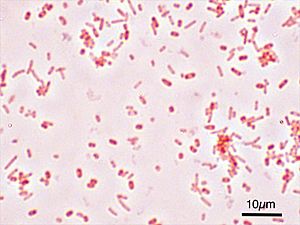Gastroenteritis facts for kids
Gastroenteritis is a common illness that makes your stomach and intestines feel upset. It's like your digestive system gets a temporary swelling or irritation. This often leads to diarrhea, vomiting, and stomach pain. People sometimes call it a "stomach bug," "stomach virus," or "infectious diarrhea." Even though it's sometimes called "stomach flu," it's important to know that it's not caused by the same influenza virus that gives you the regular flu.
Contents
What Causes Gastroenteritis?
Gastroenteritis is usually caused by tiny germs that get into your body. The most common culprits are viruses, but bacteria can also cause it.
Viruses that Cause Stomach Bugs
Many cases of gastroenteritis come from viruses. These viruses are very small and can spread easily.
- Rotavirus: This used to be a very common cause, especially in young children. Now, there's a vaccine that helps prevent it.
- Norovirus: This virus is known for causing outbreaks, like on cruise ships or in schools. It spreads very quickly.
- Adenovirus: Another type of virus that can cause stomach upset, especially in kids.
Bacteria that Cause Stomach Bugs
Sometimes, bacteria can cause gastroenteritis. This often happens when you eat food or drink water that has been contaminated.
- Salmonella: You might get this from eating raw or undercooked chicken or eggs.
- E. coli: Certain types of E. coli can cause severe stomach problems, often from contaminated food or water.
- Campylobacter: This bacteria is often found in raw poultry (like chicken) and unpasteurized milk.
How Does Gastroenteritis Spread?
Gastroenteritis spreads when tiny bits of poop from an infected person get into someone else's mouth. This can happen in several ways:
- Touching surfaces: If someone with the illness doesn't wash their hands well after using the bathroom, they can leave germs on door handles, toys, or other surfaces. When you touch these surfaces and then touch your mouth, you can get sick.
- Contaminated food or water: Food can become contaminated if someone who is sick prepares it without washing their hands. Water can also get contaminated if it's not treated properly.
- Close contact: Being very close to someone who is vomiting or has diarrhea can also spread the germs.
Symptoms of Gastroenteritis
The symptoms of gastroenteritis can vary, but they usually include:
- Diarrhea: This means having watery or loose bowel movements often.
- Vomiting: Throwing up the contents of your stomach.
- Stomach pain or cramps: Aching or sharp pains in your belly.
- Nausea: Feeling sick to your stomach, like you might vomit.
- Fever: Your body temperature might go up.
- Headache: Some people also get a headache.
- Muscle aches: Feeling tired and achy all over.
These symptoms usually start suddenly and can last for a few days.
How to Feel Better: Treatment and Care
Most cases of gastroenteritis get better on their own. The most important thing is to prevent dehydration, which happens when your body loses too much fluid.
- Drink plenty of fluids: Sip small amounts of water, clear broths, or oral rehydration solutions (like Pedialyte). These help replace lost fluids and salts. Avoid sugary drinks like soda or fruit juice, as they can sometimes make diarrhea worse.
- Rest: Your body needs energy to fight off the infection.
- Eat bland foods: When you start to feel hungry, try eating simple, easy-to-digest foods like toast, crackers, bananas, or rice. Avoid spicy, greasy, or sugary foods until you feel completely better.
- Avoid certain foods: It's best to avoid dairy products, caffeine, and alcohol until your stomach settles down.
When to See a Doctor
Most of the time, you can manage gastroenteritis at home. However, you should see a doctor if:
- You show signs of severe dehydration, like not peeing much, feeling very dizzy, or having a very dry mouth.
- You have a very high fever.
- You have severe stomach pain that doesn't go away.
- There is blood in your vomit or diarrhea.
- Your symptoms don't get better after a few days.
- You have a weakened immune system or other serious health conditions.
Preventing Gastroenteritis
The best way to avoid getting gastroenteritis is to practice good hygiene.
- Wash your hands often: Use soap and water for at least 20 seconds, especially after using the bathroom, before eating, and after touching animals.
- Clean surfaces: Regularly clean and disinfect surfaces that people touch often, especially in the kitchen and bathroom.
- Cook food properly: Make sure meat, poultry, and eggs are cooked all the way through.
- Store food safely: Keep raw meats separate from other foods and refrigerate leftovers quickly.
- Drink safe water: If you're traveling, drink bottled water or water that has been boiled.
- Get vaccinated: If available, get vaccinated against viruses like rotavirus.
By following these tips, you can help protect yourself and others from this common stomach bug!
Images for kids
See also
 In Spanish: Gastroenteritis para niños
In Spanish: Gastroenteritis para niños




